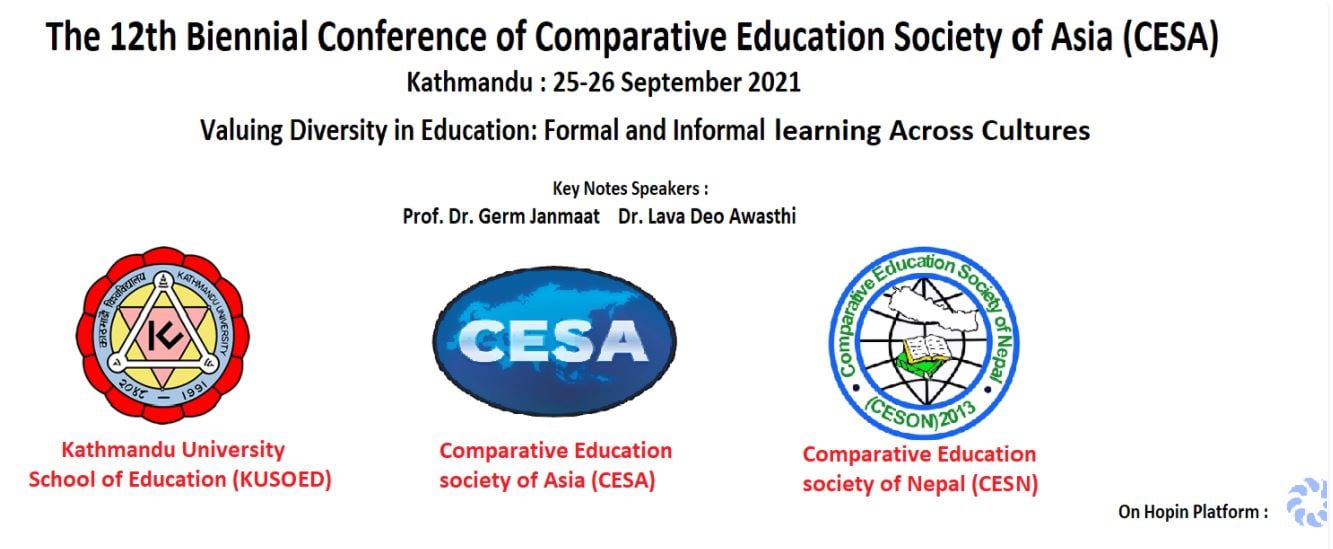0%

KATHMANDU: The 12th Biennial Conference of Comparative Education Society of Asia (CECA) has kicked off in Kathmandu on Saturday with the theme ‘Valuing Diversity in Education: Formal and Informal Learning across Cultures”.
Organized jointly by CESA, Comparative Education Society of Nepal (CESON) and Kathmandu University, more than 200 research papers of scholars from 18 countries are to be virtually presented and discussed on September 25-26.
Inaugurating the conference, Prof Bhola Thapa, Vice-Chancellor of Kathmandu University, emphasized that borrowed knowledge and education may not fit well in the local context so learning should be localized and contextualized. He further remarked that enhancing quality higher education needs improving the quality of education at the lower level.
Welcoming the delegates, Prof. Mahesh Nath Parajuli, the Dean of Kathmandu University School of Education and the convener of the conference focused on localizing knowledge and practices and urged all to see the diverse ways of creating knowledge and educating the mew generation.
Similarly, Prof Subodh Sharma, the Registrar remarked that education should not always incline towards formal system, it should seek alternative ways and urged all to reach those places where children are still deprived of education. He urged educators to provide education in such a way that makes graduates polite and honest who respect humans’ values.
Prof. Liu Baucun, Chair of CESA, urged the participants to commit to transforming education through education and urged all not to rely on formal education. He focused on diversity in education and focus on the informal way of learning.
Prof Tanka Nath Sharma, the CESON chair advised the participants to share research-based practices to address the learning needs of diverse cultures and focused on prioritizing such education that transforms an individual and society to a great extent.
At the end of the opening ceremony, the Chair of the conference, Prof. Laxman Gnawali, highlighted the program and reiterated that non-degree education also plays a significant role in educating an individual. He mentioned that delegates from 19 countries are attending in the conference and two keynotes, 9 panel discussions and 186 papers will be the highlights of the conference.
According to the Kathmandu University, the CESA conference 2021 will focus on the everyday learning and life quality to recognize the social and cultural ways of learning to live together, learning to know, learning to do and learning to be as highlighted by the UNESCO in 1966. In general, the conference will aim to generate knowledge on everyday learning, lifelong learning, and quality of life.
The specific objectives of the conference are to generate and disseminate knowledge on everyday learning and lifelong learning and its contribution to life quality, to deliberate on the aspects like quality, equity, and justice in everyday learning context, to highlight the social and cultural dimension of knowledge generation through everyday experience and lifelong learning, to discuss ways to link everyday learning with emerging needs and advancements, to hold dialogues on the role and contribution of everyday learning to formal, non-formal learning, to provide a forum to educational actors to share their knowledge and experiences on literacy, everyday learning, and life-long learning for life quality and to deliberate on how education works in the immediate everyday contexts and how it connects to life.
Associate Professor and Head of Department of Development Education in Kathmandu University School of Education, D Prakash Chandra Bhattarai shared the themes to be discussed on the occasion are philosophy and cultures of education, new practices of education in Asia, curriculum development, fiscal structures of school system, school governance, unequal access and participation in education, use of learning technology, education and sustainable development, education and market, challenges brought out by COVID-19, life-long learning and political socialization in education, among others.
In the inaugural session, the speakers said that in the changing political contexts the discourses on everyday life learning and discovering the ways of learning of various ethnic communities and historically marginalized groups have been created recently. “Life-long learning is possible and strong if we acknowledge the everyday ways of learning in the political spheres as well”, they added.
Jan Germen Janmaat, Professor of Political Socialization, and Dr Lavadev Awasthi had delivered the key note speech on the occasion. Dr Bhattarai, also the general-secretary of CESON, commented that the conference has contributed to advance the ongoing discourse on Nepal’s comparative education bringing together different perspectives from across the cultures and geographies.